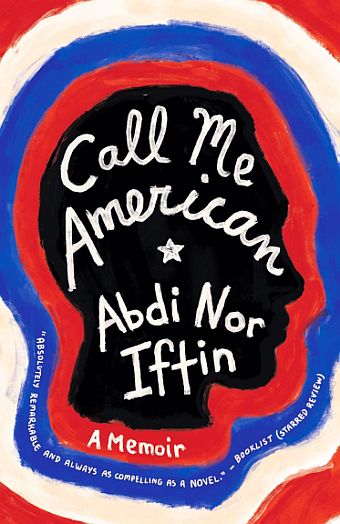
Call Me American

Abdi Nor Iftin’s memoir Call Me American is not what I expected. Having already enjoyed Somali immigrant books about soccer in Lewiston, I was expecting the American “victory lap.” Not so with this young man who finally arrived at Logan Airport on p. 258 when he was in his late twenties.
Most of his memoir tells the story of his more than twenty years in Civil War Somalia. Yes, there are a few happy years with his family before war, living a dreamlike nomad life. His dad was a basketball star of renown and the happy memories are short and brief. Trekking to the city and the following years and years of war are beyond my comprehension.
Abdi and his brother choose different paths. Memorizing the entire Koran under such terror teacher techniques makes me sympathize with Abdi’s rebellious brother who refuses the daily discipline.
Losing contact for three years with his father is another loss and brings Abdi’s obligation to his mother’s survival. Frequenting American movies was Abdi’s big transgression to Muslim life, but soon his American speech and translating ability gained him fame like his dad’s basketball stardom years before.
Somehow good luck follows his ever-so-long war torn trek through his hometown of Mogadishu, Somalia and environs: nothing but civil war everywhere. Even meeting a girlfriend at the beach and swimming in the salty sea, breaking another Muslim rule.
Abdi’s American speech reaches NPR here and BBC in London. He carries on weekly radio interviews in his deep underground hidey-hole in his war torn Mogadishu home.
Luck strikes Abdi, but to me, the reader, it is all so very dreary from day to day with challenges for finding food for his mom and quiet sleep from noisy war. “This was the beginning of my new life…practicing how to dance with the crowd on the sidewalk…I decided if I was going to talk like an American, I should dance like one.”
However accomplished Abdi became with his daily Koran memorizing and discipline it required, friends would knock on the door and ask his mom, “Is Abdi American here?” At age fourteen, he was kicked out of his home and he went to find his rebellious brother who had not memorized the Koran like he had…very discouraging to read this story of his constant struggles in spite of successes. Living on the edge with warlords all around ready to chop a hand or leg off is way beyond my comprehension.
Abdi survived and so did his brother. Abdi’s work experience in Yarmouth was not an American dream fulfilled, yet he had a kind American family providing a safe home and abundant food. He finally found Somali friends in Portland where he moved and worked as an English translator. The weekend soccer games were a relaxing release with Somalis who had lived here ten years.
Meeting a new girlfriend and her family were also trying in his life due to Muslim demands by the parents. Did he marry her, I wonder?
Finding so many resolutions at once at the end of this memoir makes me wonder about his brother still in Kenya with a wife and children by now. His mom and other relatives receive money regularly from Abdi, making life so much more bearable back in Somalia. But, how does he keep a’going I keep asking myself. Speaking American actually got him here after too many hoops and years in Kenya camps waiting.
I am hoping to meet this good-luck guy in August, who has faced far more than I can totally take in.
What does he make of Maine lingo? Maybe he saw a movie or two in Mogadishu with Maine American actors spoken like us? Ayuh, hope so.
Download Full Newspaper: High Res | Low Res (Details…)
<— Previous Article • Summaries • Next Article —>
©2025 by Summertime in the Belgrades. All rights reserved.